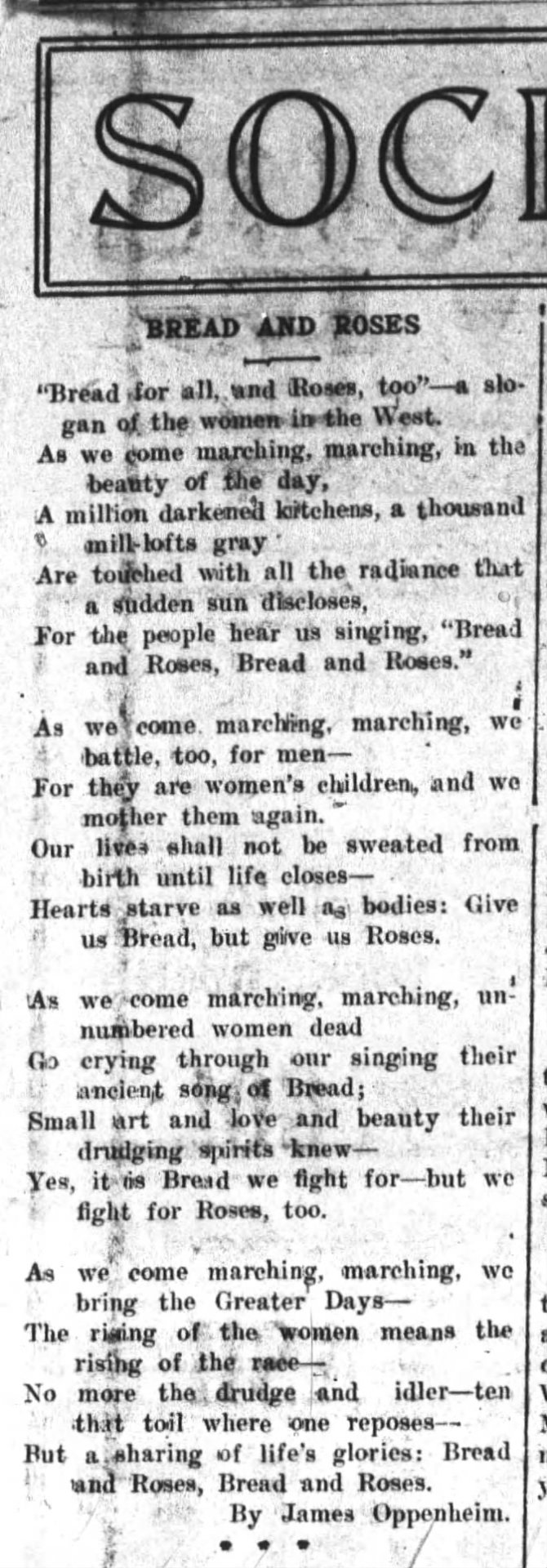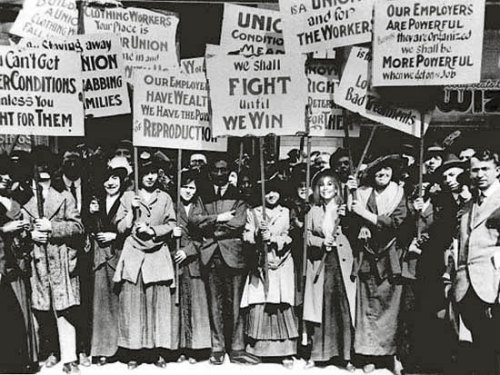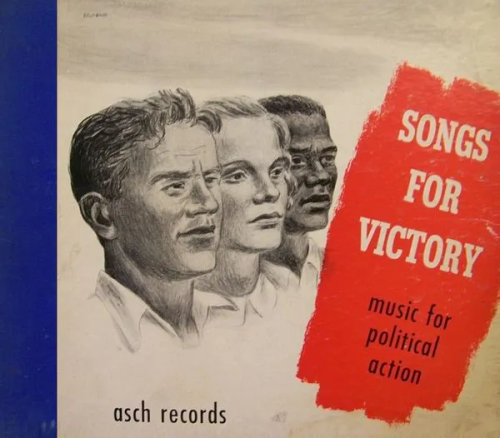Protest Folk - Tumblr Posts
"Country music gone woke!"
Woody Guthrie and Pete Seeger:



a classic recording. Worth listening to for a number of reasons: musically, historically and of course as something small on the course that will win.

Listen on YouTube here
The liner notes here
my plan is to post aesthetic pictures of Bob dylan for fellow queers to reblog to lure them into following my blog, where they will have to learn the history of folk music as a a traditional tool for protest and labor and the many leftist origins of folk and the ways this is often overlooked and erased especially when it comes to black artists
oh hey, unrelated, check out this cool song by paul robeson in 1924 :)
or this rendition of Strange Fruit by Josh White (1964)
or this song by Odetta in 1957
or this song by lead belly in 1936
or this Gospel song by the Freedom Singers in 1961
or this song 1961
or this song by Nina Simone in 1965

"Born to Win By Woody Guthrie" by Ricardo Levins Morales / Northland Poster Collective 1979
Song of the day
"Free and Equal Blues" Josh White, 1940s
this song was also covered by Earl Robinson here in 1957
Song of the day
(do you want the history of your favorite folk song? dm me or submit an ask, and I'll do a full rundown like here)
"Bread and Roses"
Judy Collins, 1976
since its labor day i thought we could talk about some good ol' IWW labor history
in 1911, Helen Todd gave a speech about women's suffrage and ended it
"Not at once; but woman is the mothering element in the world and her vote will go toward helping forward the time when life's Bread, which is home, shelter and security, and the Roses of life, music, education, nature and books, shall be the heritage of every child that is born in the country, in the government of which she has a voice."
James Oppenheim, inspired by this speech, created the poem "Bread and Roses" in 1911, whose words would later become the lyrics for the judy collins song.

in 1912, 30,000 immigrant textile workers in Lawrence, Massachusetts, went on strike due to poor working conditions and poor pay. this strike was led by the International Workers of the World and was comprised mostly of women. the phrase "bread and roses" was all over signs and became the slogan of the strike, with it even being called the "Bread and Roses Strike". like many strikes in the USA it was absolutely brutal for the strikers, and several people died, but they were able to win some of their demands.

in 1970, the James Oppenheim poem was put to music by mimi fariña, and then covered by judy collins. my favorite cover is by Utah Phillips in 1983 , where he explains the history of the textile strike and the meaning of the slogan
Hearts starve as well as bodies; give us bread, but give us roses 🌹
Joan Baez & Bob Dylan "With God On Our Side" Newport Folk Festival, July 25, 1964.

from "People's Songs" newsletter, may 1947, vol. 4
Song of the day
"Talking Wheelchair Blues" written by Fred Small 1983, performed by Peggy Seeger 1992
Orinally written and performed by Fred Small, "Talking Wheelchair Blues" is incredibly important as a song for the emerging disability rights movement. I'ts funny, charming, clever, and well written. this song is very special to me as it is one of the shockingly few songs that advocate for disability rights, and it's covered by one of my favorite artists of all time, Peggy Seeger, who does a wonderful rendition of it.
"See, we're all the same, this human race.
Some of us are called disabled. And the rest--
Well, the rest of you are just temporarily able-bodied"
Song of the day
(do you want the history of your favorite folk song? dm me or submit an ask and I'll do a full rundown)
"Joshua" Odetta, 1956
"Joshua fit De Battle Of Jericho" is an encredibly old song created by african enslaved people in America sometime prior to the Civil War. Like many Old Testament songs in black gospel music, it alludes to a longing for freedom and victory against persecution. The song was first recorded in 1922 by Harrod's Jubilee singers,
and in 1925 by Paul Robeson.
the combination of this historic freedom song, the emerging civil rights movement, and the "Queen of Folk" (dubbed by Martin Luther King Jr.) lead to the best possible cover of this song by Odetta.

from broadside magazine, 1987
"Two Good Legs" by Patricia shih
you can listen to it here

National Portrait Gallery, Smithsonian Institution; gift of Chisholm Larsson Gallery, New York City, 1969
pete seeger is so misunderstood that it makes me go feral and run around my room like a wild badger, clawing at my curtains and all that.

People think he wasn't as radical as woody guthrie because he sang children's songs and spoke of love. wrong! He was blacklisted! he was called an enemy of America! he dedicated his whole life to helping make better the country that abused him, who abused him and his friends and comrades. he worked tirelessly for decades to preserve the legacy of people like woody guthrie and lead belly and all the other folks. Do you even have the slightest idea of the black hole of information that would have happened without Pete Seeger? Can you comprehend what a world without Woody's music would feel like to live in? God bless Pete Seeger.
Hi! Your "talking about wheelchair blues" post made me curious if you know any disabled folk singers?
Yea, there are actually tons!
in the early blues, there were many blind artists.
Blind Blake (1896-1934) Blind Willie Johnson (1897-1945) Blind Lemon Jefferson (1893-1929) Blind Willie McTell (1898-1959) Bo Carter (1893-1964) Sleepy John Estes (1899-1977) Blind Boy Fuller (1907-1941) Cortelia Clark (1906-1969) Rev. Gary Davis (1896-1972) Roosevelt Graves (1909-1962) Sonny Terry (1911-1986)
there's also cisco houston, whose eyesight was so poor that it rendered him legally blind by the end of his life.
and then, of course, there was woody guthrie who suffered from Huntingtons disease.
A LOT of traditional folk singers were disabled but that fact about them was not mentioned or only mentioned as an afterthought, or it isn't considered a disability. it would be very hard to compile all of these people.
and, as classic artists like pete and peggy got and get older, they both talked more about disability rights and how they affect them, peggy seeger is 89 currently and still making music. both she and Pete have either performed songs like disability in solidarity with disabled people or made music about how being disabled relates to them.
THEN, there's the Disabled In Action (DIA) singers. much like the Freedom Singers of the Student Nonviolent Coordinating Committee (SNCC), the Disabled in Action singers were a musical group that made and covered songs that were about disability rights and disability made upof members with from the DIA organization. the DIA is a grassroots civil rights organization focused on ending discrimination against Disabled people, founded in 1970, in NYC.
the folks of the Disabled in Action Singers were not very well known, and the only one who was, was Sis Cunningham, who joined the group in her eighties.

luckily for us ! they have all their recordings available on their website.
here's some fun live performances i found as well of songs either by the DIA singers or by other people about disability
There is definitely more and I'll reblog this whenever I find more disabled folk artists. if anyone knows any contemporary disabled folk artists feel free to reblog this as well. I know that people in the folk-punk scene have been making music about disability.
Song of the day
(do you want the history of your favorite folk song? dm me or submit an ask and I'll do a full rundown)
"This Land Is Your Land" Woody Guthrie, 1940
the melody is originally based on "When the World's on Fire" by the Carter family, 1933, which was based on the older song and melody "What You Gonna Do When the World's on Fire" by the Birmingham Jubilee Singers, 1928
woody Guthrie's song was written in response to the song "God Bless America" by Irving Berlin in 1938 (the original version was written in 1918) and performed by Kate Smith. He was tired of hearing it on the radio.
Like many of Woody's songs, "This Land is Your Land" is explicitly pro-worker and anti-exploitation. You could even argue that it's explicitly anti-private property. As this song got sanded down for the mainstream, its more radical themes and messages were somewhat forgotten, and it became a general patriotic song for children and adults to enjoy, the very thing that Guthrie sought to criticize in the first place.
there are many covers of this song for many different countries, but my favorite version is the live one by Pete Seeger performed in 1976, where he talks about its history as a socialist song and invites the audience to sing along with him.

Custer Died for your sins
for the tribes you terminated
for the myths you kept alive
for the land you confiscated for our freedom, you deprived
custer died for your sins
custer died for your sins
jimmy curtiss 1983
i am Obsessed with "The Union Boys" band, formed on March 11, 1944, that literally only existed for one day.
they released one album consisting of entirely anti-fascist, anti-racist, and pro union songs. And it was given its name by Moses Asch, very descriptive name.

consisting of Josh White (underrated ! listen to his music), Sonny Terry, Brownie McGhee, Pete Seeger, Burl Ives, Tom Glazer, and technically woody guthrie. this album is the reason i always have "UAW-CIO" stuck in my head lol.
John Brown’s Body / Glory Glory Hallelujah / Solidarity Forever performed by Sister Wife Sex Strike




